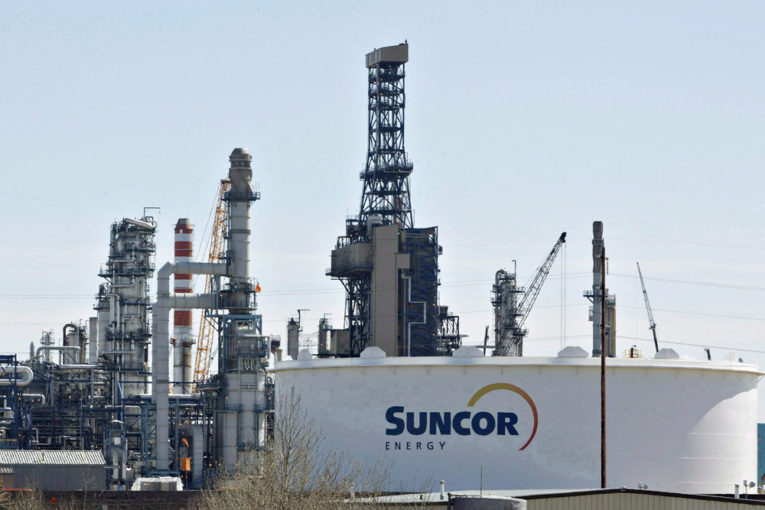
CALGARY – The forced curtailment of oil production in Alberta will make it less likely for companies to invest in new refineries in the province, Suncor Energy Inc. said Friday.
Suncor, the largest integrated oil producer in Canada, said the Alberta government’s decision to force local oil companies to curtail their output by 8.7 per cent has resulted in “winners and losers” in Alberta. The oilsands major is also discussing “unintended consequences” with the province and seeking some relief from the order.
“In the short term, the Government of Alberta action has resulted in winners and losers in the market, shutting in valuable upgrading throughput and has made transporting crude oil out of the province by rail uneconomic,” the Calgary-based operator said.
Suncor did not specifically identify itself among the “losers” in the situation, but it did oppose — along with Husky and Imperial Oil Ltd. — the curtailment and acknowledged Friday that it will need to shut in more than 8.7 per cent of its production. The company did not provide a figure for how much of its production it is required to curtail.
Despite the order, Suncor has said it intends to boost its average oil production by 10 per cent over the course of the next year.
“The Government of Alberta intervention creates long-term market uncertainty, and reduces any incentive for market participants to invest in crude oil processing facilities or commit to long-term transportation agreements,” the company said, adding the order would also result in companies “shutting in valuable upgrading throughput.”
Suncor’s announcement comes on the heels of Alberta Premier Rachel Notley’s call this week for proposals for new refinery projects in the province.
Notley also issued her government’s curtailment order earlier this month amid record-setting US$40 per barrel to US$50 per barrel discounts for Alberta heavy crude oil, relative to the West Texas Intermediate benchmark.
The order has since helped narrow the differential to around US$12.50, and boosted share prices of domestic companies that are exposed to the benchmark price. Suncor, Imperial and Husky all have downstream refineries, however, which had insulated them from the discounts.
Suncor has much to lose from the production cuts as it operates oilsands upgraders near Fort McMurray, Alta. as well as refineries in Alberta, Ontario, Quebec and Colorado.
“We feel that we upgrade or refine about 70 per cent of our production in Alberta already and the disproportionate allocation has idled some of that upgrading capacity and that hasn’t addressed the issue which is market access,” Suncor spokesperson Sneh Seetal said.
She declined to directly discuss the provincial government’s call for refinery proposals this week.
Seetal said the curtailment order could have several “unintended consequences” and as facilities operate at less than their designed capacity, there are safety concerns about potential heat loss and freezing. The company is taking steps to mitigate any potential safety risks and is in discussions with the Alberta government.
Suncor is also discussing other potential consequences with the provincial government and the Alberta Energy Regulator as the curtailment order had failed to take into account how a forced production cut would affect oil that is refined and upgraded in Alberta and its in-house production and consumption of diesel as oil consumed at its own operations.
Those factors don’t affect the volumes on clogged pipelines leaving Alberta, which were the root cause of the massive price discounts that hammered smaller oil producers in the province, the company said.
… the full effects of the cuts are likely to last only for the first three months of 2019
Raymond James analyst Chris Cox
Raymond James analyst Chris Cox called Suncor’s curtailment “mandatory charity” for smaller oil producers in a research note, but added the company’s capital budget on Friday was a positive for investors.
“While the impact of mandated production cuts in Alberta is likely to have a disproportionately negative impact on Suncor versus peers, we agree with the company’s assessment that the full effects of the cuts are likely to last only for the first three months of 2019,” Cox said.
Suncor unveiled a capital budget of between $4.9 billion and $5.6 billion for 2019 on Friday, roughly the same as it spent in 2018, but expects to grow its total oil production by about 10 per cent over the full course of the year to between 780,000 barrels per day and 820,000 bpd.
The company may be able to increase its spending in 2019 if its negotiations with the provincial government and AER on curtailment issues progress, National Bank Financial analyst Travis Wood said in a research note.
Suncor stock closed 3.3 per cent lower to $39.61 on Friday.
• Email:
You can read more of the news on source
